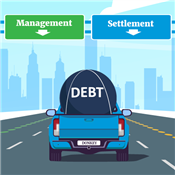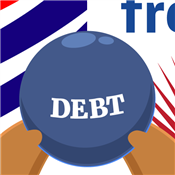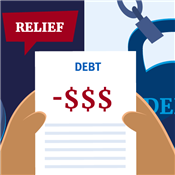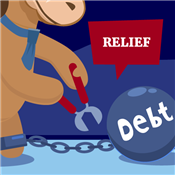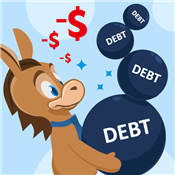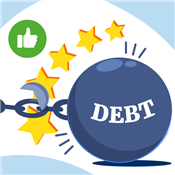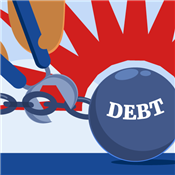Debt Relief vs Bankruptcy
Debt relief can make your debts manageable, while bankruptcy offers a clean slate. Which is the better option? Read on.
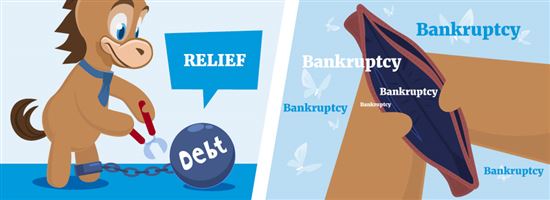 |
Debt relief can reduce your debts, while bankruptcy can eliminate them. However, note that there are negative consequences for both.
That said, both options can relieve you of your financial distress. And the more suitable one will depend on your debt type.
Keep reading to know which is better.
What is debt relief?
Debt relief reduces your debts to a lower amount, which makes them easier to pay off. Depending on the debt relief method, there are a couple of things you can do:
- Negotiate with creditors to reduce the principal of the debt
- Reduce high interest rates
- Waive loan fees
- Extend payment terms to lower monthly payments
- Combine the same debts into one monthly payment
Some of the most common debt relief methods are debt settlement, debt consolidation, and credit counseling.
Imagine Living Life Without Debt
- Get a free savings estimate today
- See how quickly you can be debt free
- No upfront fees and no obligation
Types of Debt Relief
Debt relief comes in many forms to help you manage your debts better, such as:
- Debt settlement
Debt settlement means negotiating with creditors to reduce your principal debt, eliminate interest, or arrange new terms. You'll settle the new balance with a lump sum payment.You can do a DIY and negotiate with creditors on your own. You'll reach out to your creditors and negotiate for a lower balance to pay off. On the other hand, you can sign up with a debt settlement company to do the legwork for you.
Debt settlement companies
The following companies offer a free consultation to assess your debts.- Acccredited Debt Relief can reduce your debts by up to 40%.
- Americor has helped over 200,000 clients with their debts.
- Freedom Debt Relief can help you be debt-free in 24–48 months.
- Acccredited Debt Relief can reduce your debts by up to 40%.
- Debt consolidation
Debt consolidation merges multiple debts into one and eliminates high interest rates and fees for each debt. One way to do this is by getting a debt consolidation loan or a personal loan with no origination fee to pay off smaller debts.Another way to consolidate debts is by applying a balance transfer. In turn, you can transfer your credit card debts onto one credit card, with a higher credit limit and 0% intro APR.
Read our guide on debt settlement and debt consolidation to know how both debt relief methods compare. - Debt management plan (DMP)
A credit counselor can advise you to follow a DMP, negotiate with creditors, and enroll your debts. Then, you make one monthly payment that your credit counseling agency disburses to your creditors.Credit counseling from non-profit agencies
Certified counselors have training in many aspects of personal finance and have extensive experience negotiating with creditors too. You can get advice for your debts, credit, and financial management.
Although you have plenty of debt relief options, there are reasons why you should or shouldn't go for debt relief.
Debt Relief Pros And Cons
Pros:
- Experienced professionals negotiate for you
- Creditors are willing to negotiate than risk default
- Personalized programs are fit for your budget
- Lessens contact with creditors
- Settle debts faster compared to making minimum payments
Cons:
- Creditors can file a case against you for your unpaid debts
- Missed payments instantly impact your credit (and you need to intentionally miss your payments with debt settlement)
- Doesn't qualify all types of debts
- Can get expensive, especially with larger debts
- Creditors aren't obligated to settle
- Forgiven debts may be considered taxable income
The results of debt relief can last up to 7 years. That's because you need to stop paying your debts every month before signing up for debt relief. And missed payments, late payments, and collection accounts can stay on your credit report for 7 years from the date of delinquency (date of last payment).
If you think debt relief may not suit your needs, then here are some reasons why you can go for bankruptcy.
What is bankruptcy?
Bankruptcy is a legal process that can discharge you from debts. Or it can allow you to reorganize debts into a more manageable repayment plan.
There are 2 types of bankruptcy:
- Chapter 7 Bankruptcy
Chapter 7 bankruptcy refers to liquidation bankruptcy. Its purpose is to liquidate your non-exempt assets, which are property that falls outside the necessities of living.
Non-exempt assets include a second car, vacation home, valuable family heirlooms, and the like. Trustees gather and sell these assets and use the proceeds to pay your creditors.
Advantages
- Discharges most debts and offers a clean slate
- Creditors can't pursue you for your debts
- Prevents foreclosures, evictions, or wage garnishments
Disadvantages
- Can stay in your credit reports for up to 10 years
- Non-exempt assets are liquidated to pay creditors
- Not all debts are eligible for a Chapter 7
- Discharges most debts and offers a clean slate
- Chapter 13 Bankruptcy
Chapter 13 bankruptcy is referred to as the wage earner's plan. It's strictly for individuals with regular income who want to restructure their debts into a repayment plan they can afford.
You are eligible for Chapter 13 if you have less than $2,750,000 in debt. The total includes both secured and unsecured debts upon the date of filing.[1]
Advantages
- No liquidation of assets
- You won't be charged taxes for your forgiven debt
- After complying with the repayment plan, remaining balances can be discharged
Disadvantages
- Can stay in your credit reports for up to 7 years
- You need to follow through with the repayment plan
- Need to close accounts and credit cards
- No liquidation of assets
It's not unusual for professionals to warn you about the long-term effects of bankruptcy. Bankruptcies are often seen as the last resort if you've tried various types of debt relief.
Bankruptcies can stay on your credit report for a long time. As such, you'll need to repair your credit gradually.
You can convert your bankruptcy in the event that your financial situation and goals have changed. For example, you can file for conversion from Chapter 13 to Chapter 7 if you can't keep up with your repayment plan.
On the other hand, you can convert Chapter 7 into Chapter 13 if you want to keep your assets. You can also settle debts ineligible to a Chapter 7 bankruptcy in a more manageable repayment plan (Chapter 13).
Scroll down to know the benefits and downsides of bankruptcy.
Bankruptcy Pros and Cons
Pros:
- Possibility to discharge most of your qualified debts
- Invoke automatic stay
- Bankruptcies can give you a blank slate for rebuilding credit
- Bankruptcies have a more predictable outcome in resolving your debts
Cons:
- Bankruptcies stay on credit reports the longest
- Your bankruptcy is a public record
- The court is more in control of your financial affairs
- You may lose your professional licenses
- Not all debts are qualified for a discharge, so you may still owe some debts unless you settle them
No bankruptcy can help forgive all your debts, especially if you have ineligible debts for the petition. However, Chapter 7 allows you to discharge most unsecured debts, like medical bills, credit cards, and unsecured loans.
Debt Relief vs. Bankruptcy: Detailed Comparison
Debt relief and bankruptcy differ in fees, potential savings, and covered debts, among others. These can determine which option is more suitable for your needs.
Fees
Most debt relief companies charge you a settlement fee for their service. This fee is based on the percentage of your total enrolled debts. For example, reputable companies like National Debt Relief charge 15–25% of your total enrolled debts.[2]
On the other hand, with bankruptcy, you are dealing with filing fees and miscellaneous charges.[3][4] For example, you need to pay $338 for filing a Chapter 7 or $313 for a Chapter 13 bankruptcy.
However, the biggest chunk of your bankruptcy petition is legal fees. Hiring an attorney to assist you can cost more than $1,000, depending on the bankruptcy type and complexity of your case.
Potential Savings
Bankruptcy can discharge most debts. This means it's possible to eliminate all your debts if they are eligible for the petition.
On the other hand, debt relief companies can negotiate up to half of your original debt. But considering the fees, you may only be able to save a quarter of your original debt amount.
Covered Debts
Bankruptcy can cover both secured and unsecured debts. It depends on the debt types and chapter of bankruptcy you are filing for. Discharge results also depend on the trustees and the cooperation of your creditors.
On the other hand, debt relief companies accept various types of unsecured debts, like credit card debts, unsecured personal loans, or medical bills. Some debt relief companies also help you with selected student loans.
You typically can't enroll secured debts into a debt relief program. Collateral backs up secured debts, so your lenders still have security from your assets.
Some debts aren't eligible for discharge.
- Most tax debts
- Debts not listed by the debtor in the petition
- Child support and alimony
- Government fines and penalties
- Federal student loans
- Compensation owed to crime victims
- Court-ordered restitution for victims of personal injury
- Debts owed to tax-advantaged retirement plans
The final decision on both your dischargeable and non-dischargeable debts depends on the trustees, your creditors, and your case. There's a chance that non-dischargeable debts can become eligible for discharge unless your creditors specifically request for exemption.[5]
Credit Impact
Both debt relief and bankruptcy can have an immediate negative impact on your credit.
Your credit score will drop by as much as 100 points when you miss your payments for debt settlement. Late payments, missed payments, charge-offs, collections, or judgments can stay on your credit report for up to 7 years.[6]
With debt consolidation and DMPs, you'll experience a temporary credit impact at the start. But as you make your monthly payments and settle enrolled debts, your credit will improve gradually.
On the other hand, bankruptcy can take down your current credit score by as much as 200 points and your credit report also retains your Chapter 7 or Chapter 13
record.
All accounts included in the petition will be marked with bankruptcy. And your report will reflect late payments, missed payments, or collections before petition filing.
Bankruptcy is not a disadvantage of debt. It is a legal way to help you discharge your debts and have a chance to rebuild your finances. Just note that one of its most common effects is a dip in your credit score and becoming more ineligible for loans.
Duration
You may get a discharge from your bankruptcy a few months after filing it. The entire process can last 3–6 months for Chapter 7 until liquidation is complete. Chapter 13 can last 3–5 years, depending on how the court structures your repayment plan.
That said, Chapter 7 bankruptcy can be a much quicker process than debt relief. With debt relief, negotiators go back and forth with your creditors for years.
For example, National Debt Relief programs typically last for 24–48 months.[7] But this ultimately depends on your creditors and the number of debts you have.
Eligibility
Debt relief companies don't have credit requirements. However, they typically require a minimum debt amount. They also assess your debt types and often qualify unsecured debts only.
With bankruptcy, each chapter has different eligibility requirements:
- Chapter 7 Eligibility
You'll have to take a Means Test to see if you qualify for Chapter 7 bankruptcy.If your income is below the median income for your state and household size, you will most likely qualify. If your income is higher, you may need to submit other forms to fully assess if Chapter 7 is right for you.[8]
- Chapter 13 Eligibility
Chapter 13 bankruptcy doesn't have a formal Means Test like Chapter 7. However, your income will be assessed for the development of the repayment plan.
Tax Implications
In debt relief, if your forgiven debt is more than $600 for each enrolled debt, the forgiven portion is taxable.[9] You will owe taxes for that portion, which you must pay for when you file your taxes.
Filing for bankruptcy has no tax implications. Just note that tax debt isn't dischargeable in bankruptcy.
Legal Implications
Your creditors can take legal action against you when your debt relief company starts negotiating. On the plus side, most debt relief companies have a network of legal professionals in case of lawsuits.
In comparison, bankruptcy is a legal process. It is best if you employ an attorney to assist you. Once you file for bankruptcy, the automatic stay goes into effect. This helps you have legal protection from your creditors while the process is ongoing.
Note that you need to deal with the bankruptcy court and officials overseeing your petition. Your non-exempt assets are legally sold as part of the liquidation process. You also get a court-approved plan to pay off your debts.
When to Choose Debt Relief
Debt relief is a more ideal option in situations, such as:
- If you want to minimize credit impact
If you want to maintain your credit, debt relief is better. With debt consolidation and DMP, there will be a temporary credit impact at the start, but it won't last as long as a bankruptcy. - If you can commit to settling your debts
Debt relief only works if you follow through and complete your program or DMP, or settle your debt consolidation loan. It's a commitment until you pay off your remaining balance. - If you have assets to protect
If you have accumulated substantial assets and you're not ready to let them go, debt relief is a better option.
The best results of debt relief happen in the end. So you need to consider it a long-term game that can give you a shot of significantly cutting your debts to an amount lower than what you would pay for (considering the interest and other fees keep accumulating, too).
Imagine Living Life Without Debt
- Get a free savings estimate today
- See how quickly you can be debt free
- No upfront fees and no obligation
On the other hand, there are instances where bankruptcy will work better for you.
When to Choose Bankruptcy
Many professionals would consider bankruptcy last, but there are instances when this is the best choice for you, such as:
- If debt relief isn't sustainable
Debt relief fees balloon fast. Sometimes, filing for bankruptcy helps you settle your financial obligations more reasonably given your current income and living. - If your credit is already in poor standing
If you already have several missed payments, late payments, collections, and other items dragging your credit, a bankruptcy might be less impactful to your current credit. - If you've exhausted all other options
Filing for bankruptcy means declaring you can't pay back your debt as you originally agreed to. Consider bankruptcy as your last refuge as it can affect lender decisions in the future.
Bankruptcies stay longer and they're more difficult to remove from your credit report since you willingly filed for it. In exchange for some assets or a clean credit that doesn't have bankruptcy remarks, bankruptcy gives you a blank slate in your financial life.
In reality, bankruptcy involves a lot of paperwork, and you need to keep these forms accurate and concise. Usually, you'll need to hire a bankruptcy attorney to help you get the best outcomes with appointed trustees.
Is Debt Relief or Bankruptcy Better?
Debt relief can help you decrease your debts so you can afford to pay them off over time. In contrast, bankruptcy can legally discharge you from your debts when you can no longer afford them.
Having said that:
- Debt relief may be better if you still have enough budget to commit to a program. With a set monthly payment you can afford, you can slowly repay your debts one by one.
- Bankruptcy may be better if you have exhausted all your options to pay off debts. It may also be suitable if you have eligible assets ready for liquidation.
Many professionals may consider bankruptcy a last resort since it can stay on your credit report for up to 10 years.[10]
Debt relief and bankruptcy are not the same. Debt relief companies can help you by negotiating with creditors to reduce debts. Bankruptcy is a legal process that discharges some of your qualified debts. It may also involve restructuring for a reasonable repayment plan. Both help make your debts more manageable.
Can You File For Bankruptcy After Debt Relief?
Yes, you can file for bankruptcy after a debt relief program. This is especially true if you can no longer complete your program.
Once your bankruptcy petition is granted, eligible debts are discharged. Your creditors are legally prohibited from any attempts to collect your debts after your petition is finalized.
There is no one right way to know if bankruptcy or debt relief is better for you. Bankruptcies may stay on your credit the longest, but your credit score may immediately drop for signing up with debt relief companies. You should assess your complete financial situation before choosing an option.
If neither bankruptcy nor debt relief sounds good to you, consider the alternatives in the next section.
Debt Relief vs Bankruptcy: Alternatives
Here are some other options you can consider:
- Financial planning
Overhauling your financial life takes a lot of work. You may need to apply other strategies to tackle your debts.For example, consider the debt snowball method, where you tackle your smallest debts first. It can encourage you to keep going when you cross out some loans on your list over time.
- Selling assets and generating more income
You may consider selling some assets (if you have any) to pay off your debts. That way, you avoid paying filing fees or committing to a debt relief program you can't complete.You may also consider increasing your income. Side hustles may help with that.
- DIY debt relief
You can take matters into your own hands and perform debt negotiations yourself. You just need to learn negotiation strategies and know more about your creditors.
What the Experts Say
CreditDonkey asked a panel of industry experts to answer readers' most pressing questions. Here's what they said:
Bottom Line
Debt relief can help lessen your debts so you will pay less than you owe. However, your credit may decline due to missed payments, and service fees may be particularly expensive.
On the other hand, bankruptcy can free you from your debt obligations. But it can affect your credit for a long time. Your assets may even be used for liquidation.
Since bankruptcy is more advised as a last resort, you can try enrolling in a debt relief program first. If you still have other debts after the program, you can try qualifying them for bankruptcy.
References
- ^ United States Courts. Chapter 13 - Bankruptcy Basics, Retrieved 09/25/2024
- ^ National Debt Relief. FAQs: What will your service cost me?, Retrieved 09/25/2024
- ^ US Bankruptcy Court. Bankruptcy Fee Schedule, Retrieved 09/25/2024
- ^ US Courts. Bankruptcy Court Miscellaneous Fee Schedule, Retrieved 09/25/2024
- ^ US Courts. Discharge in Bankruptcy - Bankruptcy Basics, Retrieved 09/25/2024
- ^ CFPB. How long does negative information remain on my credit report?, Retrieved 09/25/2024
- ^ National Debt Relief. FAQs: How Long Will It Take To Get Out Of Debt?, Retrieved 09/25/2024
- ^ United States Bankruptcy Court. What is the Chapter 7 "Means Test"?, Retrieved 09/25/2024
- ^ IRS. About Form 1099-C, Cancellation of Debt, Retrieved 09/25/2024
- ^ HelpWithMyBank.gov. How long can a bankruptcy stay on my credit report?, Retrieved 09/25/2024
Write to Alex Mambaje at feedback@creditdonkey.com. Follow us on Twitter and Facebook for our latest posts.
Note: This website is made possible through financial relationships with some of the products and services mentioned on this site. We may receive compensation if you shop through links in our content. You do not have to use our links, but you help support CreditDonkey if you do.
|
|
| ||||||
|
|
|

